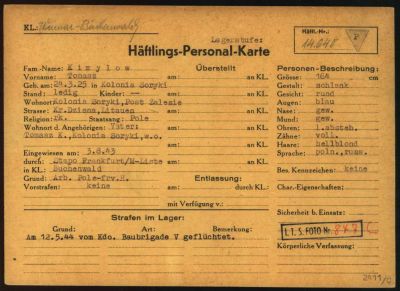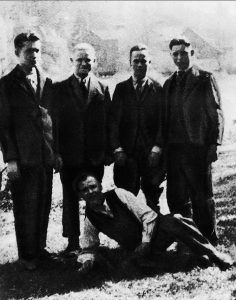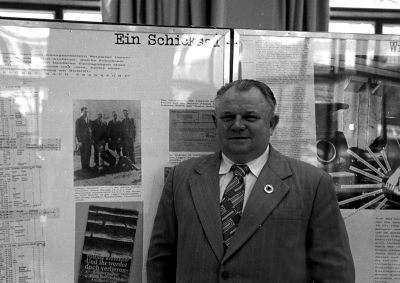Forced child labour in Hessen – The Story of Tomasz Kiryłłow

Tomasz Kiryłłow was sent from Buchenwald prison camp to labour units in sub-camps. He weighed only 48 kilograms,[25] was ill and his legs were injured[26]. He doubted that he would survive. In May 1944, he worked in one of Buchenwald’s sub-camps in Northern France (Hesdin[27], construction brigade command V). He survived thanks to Polish, Soviet and French aid networks who provided him with additional food. On 12 May 1944, he finally managed to escape and joined the French Résistance. Thanks to the resistance movement in Northern France, he survived to the end of the war[28].
After the war, Tomasz Kiryłłow visited France and Germany from Poland several times to meet with former resistance fighters or forced labourers who he had met in Hessen and to look for other former prisoners from Buchenwald. His memoirs were first published in the People’s Republic of Poland in 1980, under the title I tak przegracie wojnę. The German translation Und ihr werdet doch verlieren. Erinnerungen eines polnischen Antifaschisten (1985), which appeared in the GDR in the Diez-Verlag in Berlin, has of course also to be read against the background of a heroic narrative which deals with the communists’ fight against fascism, particularly in relation to Buchenwald, which was a symbol for the culture of remembrance of anti-fascism. The German publisher added comments to radicalise the political discourse of the text in this direction. But thanks to further historical research, today it is possible to compare this text with other statements from former forced labourers who were deported as children or as young people. A research project at the University of Wolverhampton[29] for example has evaluated 54 biographical interviews with former Polish forced child labourers.
There has been a commemorative plaque[30] in Wetzlar since 2019 in memory of Tomasz Kiryłłow.
Emmanuel Delille, July 2022
Further information:
https://wetzlar-erinnert.de/ns-zwangsarbeit/neue-ausstellung/tafel-4/
Video:
Tomasz Kiryłłow’s visit to Wetzlar in 1987, 30:21
https://www.youtube.com/watch?v=4OSrVPDbvrs
[25] Kiryłłow 1985, p. 103.
[26] His report on the hospital in Buchenwald is influenced by at least two statements which he read before he wrote his memoirs: Ostańkowicz, Czeslaw: Porażeni nie chcą umierać, Wrocław 1973; Zonik, Zygmunt: Opowieści z nieprawdopodobnego rewiru, Warszawa 1974. In this last book, it is the contemporary testimonies of a former deported doctor (Władyslaw Wikler) that horrified him. The significance of these testimonies is relative: there are many contemporary testimonies about the hospitals in Buchenwald, which were published in several European languages. These texts quote each other. They are retrospective narratives which are based both on other books and on the writers’ own memories.
[27] Cf. https://www.aussenlager-buchenwald.de/details.html?camp=101 (last accessed on 27/06/2023).
[28] Kiryłłow reports that the majority of the forced labourers of the Construction brigade command V, with whom he was taken to Hesdin in 1944, were murdered. Kiryłłow 1985, p. 194–195. Cf. Arolsen Archives.
[29] “Child Forced Labourers in Occupied Poland: Experiences, resilience and post-war discourses”, University of Wolverhampton, supported by the EVZ Foundation. Cf. Steinert 2013.
[30] https://www.hessenkolleg-wetzlar.de/2019/11/29/wir-erinnern-tomasz-kiryllow/ (last accessed on 27/06/2023); https://wetzlar-erinnert.de/gedenken/gedenktafeln/tomasz-kiryllow/ (last accessed on 27/06/2023).




